#makoto sacrifices himself
Text
....
I should replay Stanley Parable just to have Junko quote it in the third fic at some point, huh
Because that relationship of "every road you travel, every choice you make or can make had been written in advance, and they all end with your death" is. that's Junko's theme in the trilogy.
It does not matter what you do or how you do it. The story ends with Junko's death. She will die. She is going to die.
Makoto's sacrifice doesn't save her. Mukuro and Matsuda following her doesn't save her. Kyoko's love will not save her, and neither will Mikan's.
It's all scripted, and it has been from the beginning, and every route ends with Junko's death because she wrote it that way.
She gave you the book, Kyoko. You read how it ends. But up against the Ultimate Analyst who knows you so well that she can predict your actions in advance, even choosing to go against what she wrote - she already knows how you will act.
And she is determined to die.
How do you fight that?
You can't.
Junko's going to die and that's the way the story ends and there is absolutely nothing you can do to stop it.
How do you wrestle with that? How does Kyoko wrestle with that? That inevitability while other people keep sacrificing themselves to stop something that cannot - will not - stop?
#musings#bandit writes fic#dr1 end rewrite fic#kyoko multiple times already has grappled with this idea#of how to push back against what junko wants#while junko must already know what she'll choose#even if that choice is to do nothing that's still a choice#and junko must have known she'd choose that too#so what do you do when your everything has been scripted?#we even get to see Kyoko try to buck the script at the end of oafc#and junko still gets what she wants#it still plays into her hands#makoto sacrifices himself#and it means nothing#junko still does exactly what she was planning to do#albeit in a different fashion#(hah)#because junko wrote the script#because that is what needs to happen to save the world#and junko - ryoko - is determined#junko says it as clearly as she can in dr3#she's here to upset and destroy the status quo because it#like look at the status quo within hope's peak#it SHOULD be destroyed#it's screwed up#yes junko is a chaos gremlin#but at her core#the junko written here wants to irrevocably destroy the worldwide status quo#that says it's okay to just people to get ahead#it's okay to hurt people as long as you can hide it or pay it off or have enough power to ignore it
8 notes
·
View notes
Text
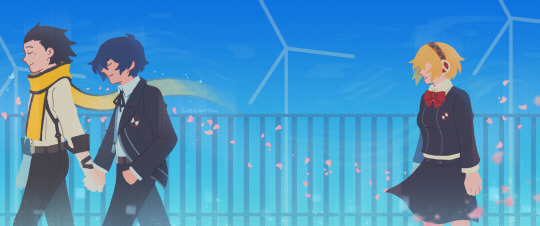
reunion 🌸
#persona 3#persona 3 spoilers#minato arisato#makoto yuki#ryoji mochizuki#aigis#ryomina#lizzy does art#HELLO EVERYONE!!! march 5th is upon us again so i bring... my contribution for this year. my third year drawing for it!#i made the thumbnail for this a few weeks after last year's graduation day#i thought it would be fun to lean into the ryominaigis angle of graduation day (you could read this as minato/aigis if you like-#but i feel like most people would read it as ryoji/minato)#IN ANY CASE working on this made me very emotional over this game :') (specifically minato)#i really enjoy how p3 ends it's such a nice way of wrapping up the narrative's messages and themes#working on this. minato's kindness was at the forefront of my mind throughout the piece#and i really wanted to capture how. ultimately it was his decision to sacrifice himself- to do the great seal#while to an outsider's perspective it is. sad that minato passes. i think becoming the seal is something that minato-#actively welcomes. in the same way that death (ryoji) is a comfort to him because death was housed in him for Ten YearsTM#AND I ALSO GOT REALLY SAD OVER AIGIS TOO. i still get fucked up over how in fes's animated cutscene for 3/5 they portray-#her as human and not drawing the robot parts so i wanted to do something smilar here...#but also i am very sad on aigis's behalf because she discovers her humanity through minato and realizes what she-#wants to do and then. well. minato is like. he's ready to pass on (even if he's scared) and im like. OH MY GOD THIS TRIO GETS ME MESSED UP#this was more coherent in my head LOL BUT ough i like drawing p3 and working through my feelings about it...#anyway! happy (in quotations) march 5th. i love this game to bits. it's so fun to draw for this day every year and see how i've improved#if you've read all this thank you :) lizzy appreciates you all very much. mwah! <3
2K notes
·
View notes
Text
Ryoji and Velvet Room Makoto AU
Makoto bargains with Nyx to bring Ryoji back and let him live life as a human.
Ryoji’s life is bound to Makoto’s.
Makoto and Ryoji are together in the great seal for some time until Elizabeth finds a way to free him.
Makoto’s physical body no longer exists, so he can’t live in the physical world anymore. However, Makoto wants Ryoji to live as Ryoji. Not the appraiser. So Makoto gives the essence of his soul to Ryoji, allowing him to become human.
Ryoji is distressed when he wakes up in the physical world and realizes Makoto is nowhere to be found. He reconnects with SEES, who are just as confused as he is. They allow him to join them when they realize that their goals align, albeit with some mistrust.
Some time after, Ryoji encounters a blue door at the end of an alleyway.
Makoto becomes a velvet room attendant for Ryoji, who begins the journey of the fool.
Makoto has lost his humanity and does not have his memories as a human.
Ryoji tries to bring Makoto to meet SEES, but they can’t see him.
Ryoji brings Makoto lots of music from the human world.
Makoto slowly falls in love with Ryoji and life again, just like how he did before.
#Ryomina nation is this anything#ryomina#ryoji mochizuki#makoto yuki#minato arisato#persona 3#persona 3 reload#combining my love of ryomina and velvet room makoto and saving makoto's soul#been listening to epic the musical and hadestown#and I feel like orpheus would totally sacrifice himself for euridyce given the option
75 notes
·
View notes
Text
you can write an ending where everyone/the main character dies and it’s still satisfying. but that is NOT how to do it
#like in persona 3 makoto dies but its still such a good and beautiful and satisfying ending#i feel like they could’ve made five sacrifice himself for the rest of the siblings i think that could work#but dont end it like this#tua s4#tua spoilers#the umbrella academy spoilers#persona 3 spoilers#tua#tua s4 spoilers
8 notes
·
View notes
Text
raincode ending spoilers. kinda
also makoto is such a great antagonist. he has consistently been a fantastic character from his first appearance until the very end. the twists, the tragedy of him, the motives. all of it is so good it all makes sense and in the final showdown i was like yknow what hes right!!! i literally sided with him so much he makes me so fucking sad i love him.
#speaking of the ending#i was a tiiiny bit disappointed?#like i already knew they were just gonna use the emergency exit cuz they mentioned it and never used it#and dont get me wrong i love yuma and this isnt another “plz kill him that would be so good for the story” type thing like i had with yakou#buuuut i feel like id be more satisfied if he did sacrifice himself after all that talk and shit#but idk i also JUST now finished it so i might change my mind after i give it more thought#gadanie#rain code#mdarc#makoto kagutsuchi
23 notes
·
View notes
Text
idk theres something about makotos overarching character arc being that he basically decided to devote his whole self into doing something he loves (being an idol and being part of trickstar) and sticking with it even when it consistently drags him outside of his comfort zone
parallels with his modelling career where he was also repeatedly pulled outside of his comfort zone, but in ways where he was being taken advantage of, where it was done to the detriment of his own self, something he wished he could escape from but circumstances prevented him from doing so until he reached a breaking point and physically could not continue anymore.
now he's constantly being pushed to do things like take charge, assert himself, and gain self-confidence, even when he doesn't quite feel comfortable in doing so. he fights back when he doesn't think he's being valued as a human being with his own desires and wants. every time he's pushed out of his comfort zone, it's for his own benefit - and even if it isn't, he finds a way to put a positive spin on it. and most importantly (to me anyways), he does this all while pursuing his dream of becoming an idol, something that doesn't come as naturally to him as modelling did, something he still feels inadequate about and is unsure he even has the talent for. but he works his ass off to be an idol despite the fact that he can quit anytime BECAUSE he loves the new path he's chosen so much
#ensemble stars#makoto yuuki#after the trauma his modelling career left him with he could have tried his best to just live a normal life#or stayed a hikkikomori forever. i dont think many people wouldhave blamed him#but instead he decided to risk it all and place himself back in the spotlight again#originally just as a way to create a completely brand new and fresh start to his life#but eventually gaining the courage and confidence to literally face his past (cameras) and make something good of it#i think many makoto enjoyers would describe him as 'ruthless' or 'pragmatic' which is admittedly a rather confusing descriptor#for those who havent pored over his stories#but its a very different sort of pragmatism from the usual that someone like. say ibara or eichi would embody in some ways#because it's more... hmm... reactionary? defensive?#the goal of his pragmatism is not to brutally force his opponents out of the way#but as a way to push himself and those he cares about forwards no matter what stands in their way#an example of this is the fact that he uses a sort of easygoing and klutzy persona on the stage#to smooth over the mistakes and relative lack of talent he had compared to the other three#and basically incorpoate his mistakes into his appeal#he does it so well that i think a lot of enstars fans legitimately have the misconception that makoto is just a silly little guy#yes hes part of the idiot combi but he's the tsukkomi. yes hes a silly guy but he can be as serious as they come when the chips are down#this is the guy who literally had to be locked in a room for a week tostop him from going back to trickstar#this is the guy who was willing to sacrifice what he thought of back then as his only redeeming quality (his looks)#in order to be an idol in the unit he loves!!!#when im out of catching up on work hell and can writemy 10k+ word makoto dissertation its fucking over for you all
24 notes
·
View notes
Note
It's slightly funny (but also slightly heartbreaking) that Majima, intentionally or not, went "well I missed my chance with my first love Makoto, best spend the rest of my life being a pest to her dead brother's boyfriend". And did just that.
We don't think about Majima and his sad life lest we fall into a pit of despair 🫡😩😭
#lmao#ask#tbf he seemed happy enough in y7 and he did have purpose in the clan and then with his building comoany#and then got saejima back so its not too bad#lowkey laughing bc i was gonna be like Oh but mirei was before makoto??#but then i remember i just made an au thats better than canon where 18 yr old majima got married to mirei and then it fell apart#bc dumb teens and yakuza and idol industry and thats half the reason hes down to sacrifice himself and why he walks away from makoto#but thats not canon thats my brain
12 notes
·
View notes
Text
still thinking abt the hope devil. imagine this great eldritch thing that can only manifest outside of a human vessel as a cascade of stars in darkness rolls up and wants SO BADLY to make a contract with you. bcs it thinks ur really silly. then gives you the power to think so hard about someone that everyone in the world will join together to kill them for you if you want.
#makotalk#i feel like my thoughts on it are very Not in line with usual csm devils bcs i have yet to read very far into the manga#but that's ok. it's my au i can do whatever i want#i do also think it offers more like. makoto can sacrifice parts of himself to summon physical manifestations very temporarily or whatever
5 notes
·
View notes
Text
Self sacrifice is baked into Ryuji at very turn.
The thief declared the most selfish by the game and narrative (as told by Morgana) is so open to sacrificing himself if it means everyone else can go on.
The boat scene, Makoto and the car, Sophia and the mysterious voice, his literal AI!
His AI is programmed to active protect more often than anyone else, he'll jump in front of attacks that will down his character so willingly
His main moveset, his most powerful skills involve him draining almost half his health bar.
#p5#persona 5#ryuji sakamoto#hobie rambles#maybe I'm just biased but#after Marvel and the way the modern mcu is treating Tony Stark#I'm tired of seeing “selfish” characters who are so selfless and self sacrificial
446 notes
·
View notes
Text
"why not join me instead?" akechi's "invitation" in conf 7
People come and go on whether this question of Akechi's is genuine or not. Opinions run the gamut from "I hate him for trying to take you away from your friends" to "Akechi wants Joker to be his accomplice".
Myself, I don't think Akechi means this as a serious question, for a number of reasons. I think this question is rhetorical.
Quick summary:
Conf 7 illustrates the similarity between Joker and Akechi, and that they're both committed to the showdown between them;
Rather than being an invitation, Akechi's question again illustrates that parallel—that neither of them will give up the things that matter to them to join the other, as Joker has asked him to do;
"I'll think about it" does not count towards the third awakening—and I can prove it. Rather, Akechi can't conceive that Joker would ever abandon his friends, and uses it as an outrageous example of something Joker would never do;
Joker's loyalty not only to his principles but to his friends is something Akechi values so much that he won't let Joker sacrifice it;
Akechi is not so much offering Joker a way out in conf 7 (there is no way out) as he's confirming for his own sake that Joker is still in the game. Is this still a battle between rivals, or is it an execution?
Let's take a look.
what is akechi really asking?
[long post is long]
Look at this line. Look at the question he's posing:
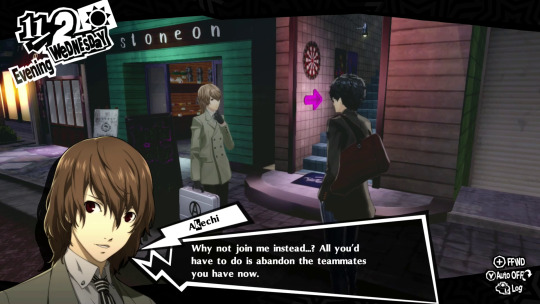
Akechi
いっそ君がこっちに来るってのは?⋯今の仲間を捨ててさ。
isso kimi ga kocchi ni kuru tte no wa?... ima no nakama o sutete sa
Why not join me instead...? All you'd have to do is abandon the teammates you have now.
It's very easy to focus on the first half of this question and miss the second. But that second half is the important part, the sting in the tail. The Japanese is a great example of wa building suspense: "Instead, what if you come over to my side, (AND THEN WHAT, AKECHI???????)"
The sentence is left hanging, with the weight of it unspoken (since wa emphasises what comes after it); Akechi is obviously not done speaking. And indeed, when he continues, it's a doozy:
"though, of course, you'd have to dump the friends you have now." (Yes, I think "friends" is often a much better translation of nakama than "teammates", fight me; it's even often translated as "friend" in P5 itself, or indeed, awkwardly, as "teammates and friends".)
Akechi is using the same verb, suteru, that you use for tossing something in the trash; the parallel meaning, "ending a relationship", exists in Japanese too.
Ryuji, Morgana, Ann, Yusuke, Makoto, Futaba, Haru, everything you've all gone through together and everything you've been—Akechi is suggesting you toss them aside like garbage. For him.
Now, I think part of Akechi would very much like Joker to do that. But he also knows better than to expect it. Because he knows Joker so much better than that.
Akechi has seen firsthand how loyal Joker is to his friends—remember on 1/2 how he says he investigated them all? He's seen some of the things Joker will do for them. He expects that blind faith to lead Joker to his death, much as Yaldabaoth does. But he also respects it.
This boy who's never had a friend, who's convinced himself the whole idea is stupid, is still drawn to the loyalty he sees in Joker. Even as he's preparing his own ultimate betrayal, Akechi recognises Joker's commitment to others. He understands treachery is bad, even though he himself is a traitor—just as he understands that murder is bad, and that doesn't stop him, either.
This question of whether or not Joker will betray his friends (and Akechi specifically) comes back on 2/2, of course—and in force.
so why does he ask
Akechi is not proposing that the two of them run off together. He's not asking to see what Joker will say. He doesn't impulsively make the invitation, and then run away when Joker says yes. He is, in fact, not even asking. He poses the idea of Joker abandoning all his friends as a counterexample. It's supposed to be something Joker would never consider, something he will find morally repugnant.
Which is why, if Joker says yes, Akechi is shocked, and essentially tells Joker not to make such stupid spur-of-the-moment decisions. Akechi is making a rhetorical point about what Joker is asking of him.
Remember Joker's statement that leads into Akechi's question:

Yeah. Joker either suggests that Akechi should give up everything he's doing and everything he believes in (even as Akechi confabulates about what those things really are), or he suggests, with the top option, that he's already done it.
And in return, Akechi says that Joker should join him... and throw away his friends and everything he's working for and everything he believes in, of course.
It's the second response to his question, where Joker turns him down flat, that makes it most obvious that this was what Akechi meant:
Joker
それは無理だ
sore wa muri da
I'm not doing that.
No way in hell.
Akechi
だろうね。
darou ne
I thought as much.
Akechi
分かるだろ、誰だって今の立場を簡単に捨てられやしないんだよ
wakaru daro, dare datte ima no tachiba o kantan ni suterare yashinai n da yo
I'm sure you understand. We all have our parts to play, and we can't simply leave those behind.
See what he's saying? ima no tachiba o kantan ni suterare yashinai—"we absolutely must not lightly set aside the positions we hold now".
Incidentally, yes, that's that same verb suteru that he used before, for casting aside or throwing away. Akechi is drawing a parallel between Joker's friends and his own goals—between the things each of them holds most dear, which neither of them will sacrifice, even to save the other. (Assuming you think Akechi would even be down to save Joker—but I do think conf 7 suggests that at this point, he might not be opposed to the possibility. It's just that it doesn't exist.)
the phone call
This parallel returns in the phone call afterwards, if you again tell him that you're rivals:
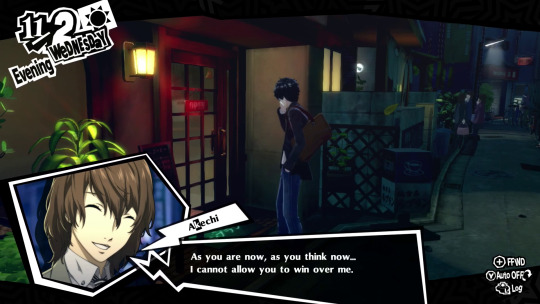
It's a little hard to tell from the localisation what Akechi is getting at, so let's take a close look:
Akechi
僕らにはお互い譲れないものがあって、そのためにも負けられない。
bokura ni wa otagai yuzurenai mono ga atte, sono tame ni mo makerarenai
[lit. for both of us, these are things we cannot compromise on, and because of those things we cannot suffer losing.]
Neither of us can afford to lose, because we fight in service of our principles.
It's the same for both of us. Neither of us can afford to lose, because of these principles we won't concede.
Akechi
⋯だからこそ、もしも君が自分を曲げたりしたら絶対に赦さないよ。
... dakara koso, moshi mo kimi ga jibun o megetari shitara zettai ni yurusanai yo
[lit. that's exactly why, if you were to warp yourself [that way], I would absolutely never let such a sin (t/n: note the kanji) pass.]
And that is precisely why... I cannot allow you to change.
... And that's precisely why, if you betrayed yourself that way... I couldn't allow it.
Akechi
だって、僕が負けたくないのは『君』なんだから。
datte, boku ga maketakunai no wa "kimi" nan da kara
[lit. it's you as you are now who I do not want to lose to.]
As you are now, as you think now... I cannot allow you to win over me.
The person you are now, with those principles, and that determination—that's the one I won't ever allow to beat me.
Here's my attempt at a translation again, so you can see it all together:
Akechi: It's the same for both of us. Neither of us can afford to lose, because of these things we won't concede.
Akechi: ...And that's precisely why, if you betrayed yourself that way... I couldn't allow it.
Akechi: The person you are now, with those principles, and that determination—that's the one I won't ever allow to beat me.
It turns out that this phone conversation, that was originally quite mystical-sounding and hard to follow (what were you trying to say, Akechi?) is quite straightforward. It ties into to his original question. "Will I join you, Joker? Well, what if you join me instead? Just throw away all your little friends for my sake? Of course you won't—because we're the same. Both of us have things we can't give up, no matter what—and if you tried to do that, I wouldn't let you, because I value you as you are...."
This parallel between the two of them is what conf 7 is about, from the text message that opens it to the phone call that concludes it:
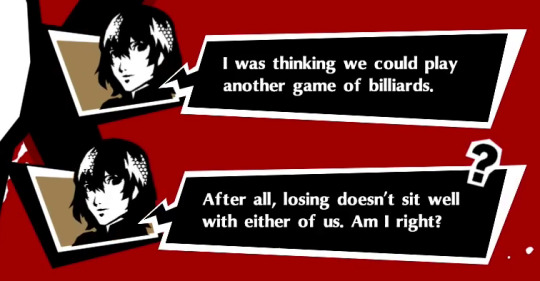
It's the same thing again: neither of you can afford to lose, because you're fighting for your principles. The billiard table is the stage for this wider discussion.
The billiard scene, of course, is interesting for another reason—Akechi is giving Joker a chance to back out; he's testing his commitment, and perhaps hinting that he never intended to be quite where he is, either. He states at the outset that he's being indirect, that what he's saying is a metaphor—and then closes that metaphor with a very direct question: "Do you still intend to play this game?"
Akechi
それでも君は、このゲームを降りる気はないの?
sore demo kimi wa, kono geemu o oriru ki wa nai no?
Even then... do you still intend to play this game?
But despite all of that, you still won't fold, will you?
The Japanese is even more specific: Akechi asks Joker if he intends to fold—not whether he still wants to play, but whether he means to give up entirely! "This can't be what you expected, so how about it? Will you just give up? Does this mean as much to you as it does to me? Is this a game we both choose to play, or are you just a victim?"
How much of this is Akechi blowing smoke up his own ass?—casting the fact that he's about to murder the boy in front of him in a glowing, romantic light? Pretty much all of it, I'd say. He's dreamed of having a rival, someone to compete with who challenges him, but what he's got is quite a bit more than that.
Again, the rival imagery is what allows Akechi not only to accept this close relationship, but to frame it as a life-or-death contest that only one of them can win. It confirms to him that what Lavenza describes as "a truly unfair game" is actually fair. It's about making Joker's murder seem as much Joker's fault as his own.
but what happens if you say yes?
Despite all of this, you can choose to have Joker consider Akechi's "offer"—to discard Ryuji, Morgana, Ann, Yusuke, Makoto, Futaba and Haru like trash, and assist Akechi instead. It's tempting, I know.
I don't personally get the impression that Akechi likes this response, for a number of reasons. None of the three responses to his offer score confidant points, but there's something else in play: only one of these responses unlocks his third awakening.

See the F code highlighted in yellow? Only one of these three responses has it. "You're my rival" counts towards the third awakening. Rejecting him, with "I'm not doing that", does not—but more to the point, offering to be with him, with "I'll think about it", also does not!
The issue is confused because a number of us have taken option 1 (or indeed option 2, like me) and still got the third awakening on 2/2. It seems like you need some of the flagged responses, not all of them. But it remains the case that "I'll think about it" does not make Akechi more likely to have his third awakening.
What happens if you take this option?
Joker
考えておく
kangaete oku
I'll think about it.
Akechi
へえ、考えてはくれるんだ?
hee, kangaete wa kureru n da?
Oh? So you'll think about it, at least?
What? You mean you'll consider it?
Akechi
⋯でも、そういうその場限りの情はやめた方がいい。
...demo, sou iu sono ba kagiri no jou wa yameta hou ga ii
...But I'd advise you don't say these things without their due consideration.
... Still, it would be better if you didn't trust such fleeting sentiments.
Akechi
出来もしない約束はするものじゃないよ。
deki mo shinai yakusoku wa suru mono ja nai yo
You shouldn't make promises that you can't keep, anyway.
Don't be the sort who promises the earth and walks away.
A few grammar points:
んだ n da on a question demands an explanation; Akechi's question could almost be rendered "Why on earth would you need/want to think about it?"
そういうその場限りの情 sou iu sono ba kagiri no jou—"sentiments that only matter here and now". Essentially, "sentiments that won't last"—or that are makeshift or ad hoc; Joker is making a stupid spur-of-the-moment decision.
yes, 出来もしない約束 deki mo shinai yakusoku translates idiomatically as "promising the earth". The point is not that Joker should not promise; the point is that he shouldn't be the sort of person who promises so much—and then doesn't follow through.
Again, this confidant is all about Akechi's expectations for Joker. It's about the weird belief he has in him, like the belief he has in Shido—that Joker has principles and friends and will stand by them, that those things are important and matter, even if they're diametrically opposed to Akechi's principles and the things he wants.
The fact that they foil each other in this way is a large part of what makes Joker such a worthy opponent for Akechi. So if Joker turns around and says, sure, Akechi, I'll dump all my friends so we can make out?
Akechi does not like that. He thinks better of him!—he loses respect if Joker offers this. Even if that little line about "promising the earth" suggests that, actually, yeah, he would quite like for the two of them to run away together—if only they lived in a world where it was possible.
what about "you're my rival"?
I've discussed this line before, but let's go into it for completeness.
Joker
明智は好敵手だ
akechi wa koutekishu da
You're my rival.
Nah, you're my worthy opponent.
Do you see that Joker names Akechi there? He doesn't just say, "we're worthy opponents", or even "you're my worthy opponent", koutekishu da yo.
No, he picks Akechi out by name, and then tells him exactly what they are to each other. Because wa builds suspense. Akechi wa... (what?! what is he?!) koutekishu da. "I can't run away with you, because I need you to be this to me instead".
And this is the line with the F-code. This is the line that, if you choose it, will build towards Akechi's third awakening—which is centred on his trust in Joker, on the fact that Joker is worthy of that trust.
And how does Akechi respond?

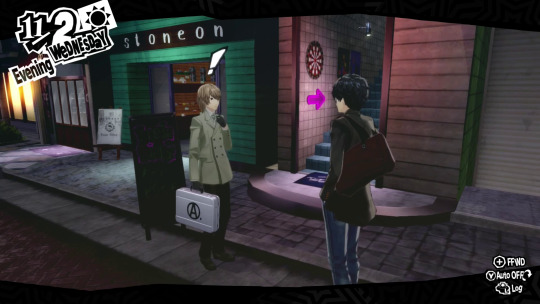
He's astonished. He did not expect this at all, look:
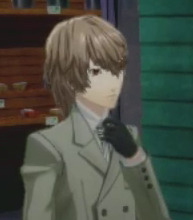
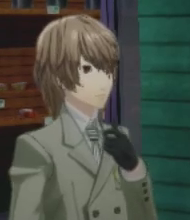

On the left, the top screenshot where he's waiting for your answer; in the centre, the moment of shock, where he's pulled away and dropped his hand and his eyes are wide; on the right, a comparative overlay just to demonstrate that he pulled back.
smiles that aren't smiles
I have a half-assed theory that you can tell when Akechi is really smiling—because the model will smile with him. If you watch, for instance, Ryuji, the model's expressions match the sprite's almost exactly. But if you watch Akechi? Nah, not so much.
Here's an example. Akechi appears to smile quite often through conf 7—but if you glance away from the sprite and textbox to the model, the model is pokerfaced. Five smile sprites on the optimal route through conf 7, and not one of them—not even "you truly are fascinating"—matches the model:
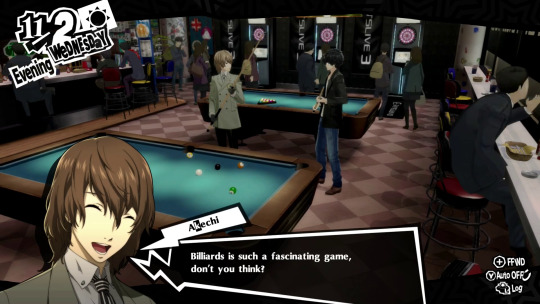
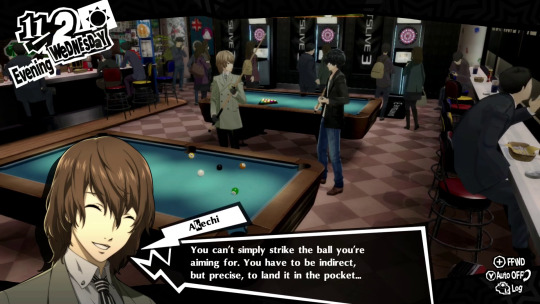
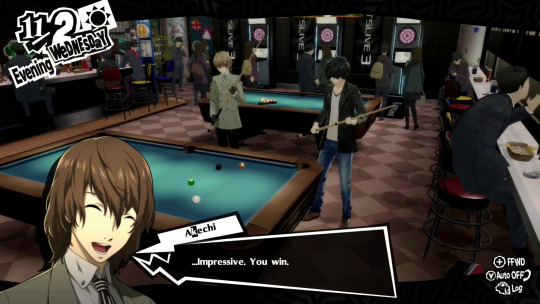
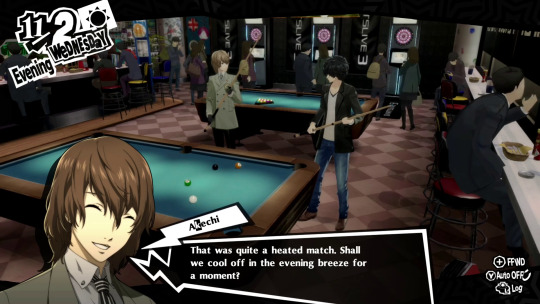
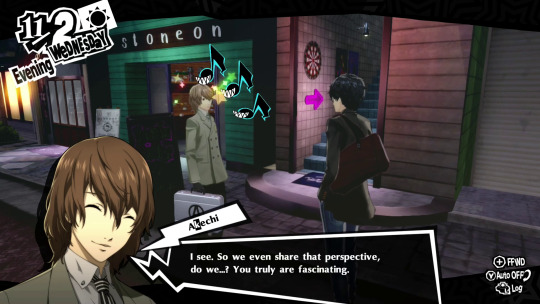
But when you pick "You're my rival"? Suddenly the model's face springs to life:


It's obvious from everything else that this moment is of deep significance to Akechi. But this little detail with the smiles suggests we can confirm it.
and what does he say?
It doesn't take long for him to pull himself together:
Akechi
同意だね、僕らにはなれ合いより対等な関係こそふさわしい。
doui da ne, bokura ni wa nareai yori taitouna kankei koso fusawashii
I agree. I think a relationship of equals suits us better than being co-conspirators, anyway...
This is another one that I find unclear in the localisation, so let's have at it.
nareai suggests an illicit or unduly-close union. It suggests "being in bed together" in the business sense—cosying up, colluding, conspiring. It suggests they're working together when they shouldn't be. Jisho uses the screamingly-outdated term "common-law marriage" (what we call "living together") as an example. Essentially, it suggests they're too close—or even co-dependent, in a way that corrupts them both.
In short? Akechi's "co-conspirators", nareai, means "accomplices"—what we might call "murder boyfriends".
taitouna kankei—literally, "an equal relationship"—is a set phrase, and we know what it means. It suggests a relationship where nobody is being cheated; where everyone gets out what they put in. Where the two of them compete on equal terms.
That's a very Akechi way to look at relationships. But it's also a relationship where nobody is in charge; nobody is dominant, and everyone has self-respect. Nobody is chasing after anyone or sacrificing unduly, as either would be if they joined the other. Everyone can be who they are and say what they want. Everyone can say no.
It's the sort of relationship Akechi very notably does not have with Shido. Is it the sort of relationship he has with Joker, when the two of them are hiding so much from each other and lying so much, and there's so much, like, murder going on? Nah. But as an aspiration, as a suggestion of the sort of relationship Akechi would like them to have, alongside everything else he's told us about how he sees the two of them—as similar, as equals and opposites, as bound by their principles, as destined to fight—it's almost touching.
and what does joker think?
Akechi
⋯たとえこの先、何があろうともだ。
...tatoe kono saki, nani ga arou tomo da
...No matter what else may change.
...No matter what might come next.
Akechi
それだけの事を言ったんだから、逃げないでよ?
sore dake no koto o itta n da kara, nigenaide yo?
In any case, what you just said carries great weight. Remember what you decided, and don't run from it. All right?
[lit. don't run away just because of what [I/you] said, all right?]
I'm not sure about this. It feels like it should be referring back to Akechi's last line—"don't get cold feet and run away just because I alluded ominously to whatever's coming next, okay?". I guess it could be referring to Joker's commitment, with "You're my rival"? IDK, I'm out on this one, so I'm inclined to give the localisation the benefit of the doubt.
But it doesn't matter. Because the significance of what Joker does next doesn't change:
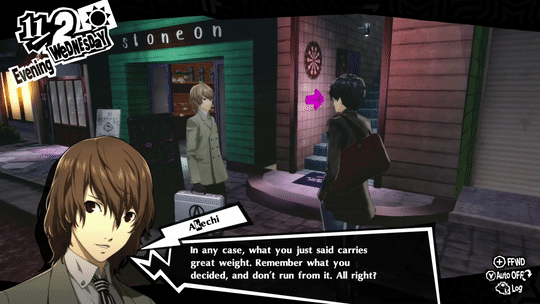
He nods. Akechi spends the whole confidant hinting that something ominous is coming, and that the two of them are heading to an inevitable confrontation, and Joker nods.
I don't think this is really consistent with interpretations where Joker is a meek little sheep in the interrogation room. Joker might not have chosen this, he might not have wanted it, he might have by far preferred to avoid it. He'd happily back out if Akechi would just drop the whole thing and agree to act sane. But he's committed to it. He agrees to fight.
Remember, conf 7 takes place after Joker hears the murder phone call. He knows what Akechi is. He knows what he's planning. He knows the stakes—and he agrees to play, to face Akechi down.
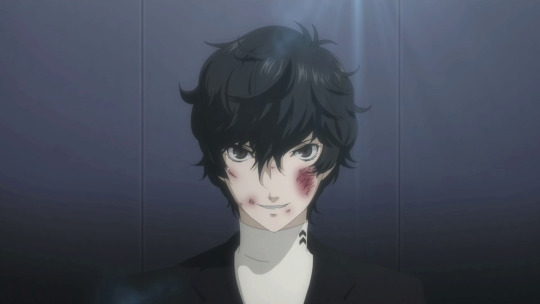
To quote @nardaviel, that's no sheep. That's a full-on "Phantom Thieves win again, motherfucker" smirk. Joker played Akechi's game, with everything he had—and he played to win.
#persona 5#p5 meta#japanese language#shuake#goro akechi#ren amamiya#almost the worst part of this is that akechi respecting joker for his loyalty tells you how little he respects himself#also! 'i'll think about it' CANNOT POSSIBLY unlock the third awakening#because the third awakening is *all about trust* and saying yes to akechi proves that you're a traitor#and that 'i won't forgive you if you betray your principles' on the phone? also 2/2. this is exactly what he does if you take the deal#also!! joker makes a third option to akechi's question with 'you're my rival' and this is what astonishes him besides the thing itself#also! (per leonawriter) the maruki deal ending is essentially the nareai relationship#where akira has all the power and akechi..? well#nobody is themself or choosing for themself#also as regards whether akechi is lying he proves himself through action#'i won't let you betray yourself' - he did that already if you tried to take the deal#ALSO? that 'megeru' for 'i won't let you depart from your principles comes back on 2/2#as joker's 'i won't fold'#and ofc it's ALSO akechi's 'you'd fold over...' that precedes that. it was set up in conf 7 if you took the rival route#so tldr it's plausible that 2/2 is as much akechi fighting for his vision of joker as for his right to die. help???#ALSO. did you wonder why it's *awakening* akechi who comes to leblanc? the one closer to you who believes in you more?#this is exactly why. awakening akechi has faith left in you to lose. non-awakening akechi already lost that faith. BYE
618 notes
·
View notes
Text
suzume no tojimari spoilers ! hi guys im Insane
literature analysis brain is going haywire so here’s a bunch of incoherent ramblings some themes motifs and symbolism i love in this movie because AAAAAAA
Love and Sacrifice.
Obviously, but like the different kinds of love and devotion and how they’re never perfect and sometimes self-destructive but they’re so powerful and just waughhh. It was so important to me how after exploding at her Tamaki (suzume’s aunt, ik im not the only one who forgets names) was like “you know I don’t feel that way all the time, right?” like not denying that yes, she has felt exhausted of taking care of Suzume and sometimes wished she didn’t have to take care of her, trying to be the parental figure she needs while also trying to not encroach on her sister’s memory. It means so much to me that she didn’t deny those feelings but instead told Suzume that it’s not how she always feels, because loving someone means sacrifice and ewughghgghfgfh im not putting this into words well but htrggfhgf.
and ALSO the reciprocation of kindness with daijin - as thanks for the taste of freedom at last, and wanting to be with someone whom you love but not really comprehending that what they want (that “suzume doesn’t love me” killed me) and how by the end daijin helped her pull souta out and sacrificed himself for suzume because he really loved her ggrgfggfhfnfnch
And just. everyday love. This is kind of a mix of themes and motifs but every time we flashed back to the memories of whatever abandoned place they were in - the simple “good morning”s and “be back soon” and “it’s so hot”s made me choke up. the mundane love of Chika and Suzume in their newly found friendship, Rumi’s kindness in picking Suzume up off the street and her love for her children, Serizawa’s platonic love for Souta letting him drive these two crazy women with crazy beef for 7 hours across Japan, there’s just so much expression of love and the hardships people go through because of it and rhgrjgrjhgdhgjhb
Mourning and Closure.
Makoto Shinkai himseld said that he wanted to write a story about “mourning deserted places” (at least according to Wikipedia) so this one is all but textual but like yeah. the motif of opening/closing/locking doors and locking the bike and things like that? AaAAaAaa
To close the gates, you need to imagine the emotions of people who once lived there - i can only imagine what Souta was thinking in the abandoned bathhouse area, but hrhggejghw the school and the amusement park and the shots we got of normal life in tokyo before the worm revealed itself in the climax, it just. really speaks to the beauty of everyday life. im a sucker for that kind of stuff as both a psychology major and just a weird person who thinks “man i wonder what happened to this person for the past 22 years of their life that led them to be here with me in this moment” whenever i pass someone in the grocery store. Hodaka could let japan be flooded in weathering with you because of his love for hina, but suzume’s whole arc was learning about the common people and living their lives and embracing all the kindness they had to offer to herself and others and it really hits that like. of course she can’t just let tokyo get destroyed to save Souta, every person in all of tokyo is just like Rumi and Chika and Serizawa and they’re all people who love and are loved. She finds herself in Souta’s place as one who stretches himself thin between being a gate closer and studying to be a teacher because he loves life as well, and-
oops i forgot i was talking about mourning and closure
anyway the doors keep getting reopened because the grief never fully goes away and the worm of “calamity” is letting yourself be consumed by the grief and destroying the people around you and not being able to move on, and it comes from the Ever-after becomes ever-after is a place where time doesn’t exist and you wish you could be there forever because it’s where you can relive the events of your past, it’s where you can live in denial that time moves forward and you have to move with it, it’s where Suzume goes after her mother dies because she wants people to stop giving her condolences and just give her her mom back. “Ever-after” in itself is a “happily ever after” - a place where mortals aren’t meant to go, no matter how beautiful it looks. Souta goes there too because he is the catalyst Suzume needs to go back and face Ever-after - and it’s no longer beautiful, but it’s torn apart by grief and everything is in flames. The idea of a keystone as well, locking the memories and hurt away, is one that Suzume removes to relive her memories and puts back in place when she’s ready to move on. htrhgfhgfghfghf. she won’t let souta be the keystone because she refuses to move on without him.
Also both Souta and his grandfather tell Suzume to just forget everything she’s seen, but it’s too late for that because connections aren’t so easily forgotten. Even when Tamaki couldn’t remember telling Suzume she’d be her new mother, that doesn’t change that she cared for her for the next 12 years anyway. Suzume visits Chika and Rumi by the end, and obviously she’s never forgotten her mother, both because her chair was still in her room by the start of the movie and because she looks like her by the end. Even though relationships change, they’re never forgotten in the movie, and I think that’s beautiful, really.
(also cool detail: 12 years ago is when the tsunami that killed suzume’s mother struck. the movie came out in 2023, and the touhoku earthquake/tsunami that inspired this film was in 2011. nice)
Reality vs Fantasy
The scenes where Suzume goes out into public again following stopping the worm from destroying Tokyo were especially poignant to me. This girl’s been going on a fantastical adventure with her talking chair and talking cat, meeting nice people and making friends, excited at the idea that she’s doing something important, but after Souta’s gone she shuts down. Her feet are bloodied, her clothes are destroyed, and people keep giving her strange looks and calling her homeless because she may have stopped the worm but even without being consumed by grief, it still isn’t pretty or picturesque. Standing out in Japanese society is discouraged, as most of us are well aware, but she’s been doing nothing but that with all the running around and talking to chairs and flying through the sky she’s been doing. Without a concrete goal in mind, without Souta as company, she’s alone in the world of adulthood and has no one to tell her what she should do, no Souta to guide her through Tokyo. And without that confidence or charm, people don’t come to her aid like they did before. It’s only once she finds her resolve to save Souta, quite literally walking in his shoes/footsteps, that the next helpful stranger (Serizawa) comes in.
She could imagine those abandoned places as alive, but the truth is that they were abandoned and will stay that way - none of them miraculously revived by the end, unless something happened in the credits that I couldn’t see through all my tears. Reality will not bring those places back, but what really matters is how we carry the memories of those places with us? I think. man maybe it’d be easier to write this post if i had actually seen the end credits
this post is really fucking long so im calling it here 😭 makoto shinkai has done it again. goddammit
#suzume no tojimari#suzume no tojimari spoilers#suzume spoilers#suzume#SCREAMSSSSSSSSS#IM SO NORMAL ABOUT THIS MOVIE
871 notes
·
View notes
Text
I am so inspired by this post from @miss0atae. I completely agree with every word 💖
I don't know if we see more in this series than there is actually in it (it wouldn't be the first time when fans have better thoughts and ideas about productions than the creators themselves ^^), also these are only two episodes, but I want to believe that the series wants to deconstruct "one true love", "fated lovers" tropes, the clinging to the past, idealizing it and idealizing loved ones, living in illusion, and the meaning of painful sacrifice.
The worst thing about all this is that San has a lot of time in which he is stuck and does not change, whereas he did not have this time 100 years ago.
He didn't have time to experience love with all the good and the bad, because his romance with Wat was short-lived and all the time San and Wat were on cloud nine, they had no opportunity to create A RELATIONSHIP, live together, get to know each other from other sides, also the not so good ones.
SAN ALSO HAD NO TIME TO MOURN WAT'S DEATH. His decision to wait for reincarnated Wat was made under the influence of great emotions, overwhelming pain, even in a frenzy. Would San do the same a month after Wat's death? Maybe, maybe not.
In this episode alone, the series touched on mourning the loss of a loved one in the words of Vee's grandmother and Vee himself (whose words come as a shock to San, who never even thought of such a thing).
It seems to me that San did not know Wat fully, that he created an idealized image of her (which is not difficult, because Wat was just a good person, she was nice and loved San sincerely), especially since he said about her several times that "he must repay her for being kind to him", which is not a very good foundation for love.
I also got the impression that his problem with Vee wasn't so much that he was a guy, but that he wasn't exactly Wat. San catches himself repeatedly, finding Wat's smile in Vee's smile, her actions in his actions. But what he is most upset about is that Vee is simply different, that he has wet dreams about him, that Vee is direct and openly flirtatious, that he might be a criminal - meaning, that he is everything that the perfect Wat was not.
And the fact that Vee being a guy is not such a big problem (though of course it is to some extent) is proven by the fact that in his dream San is not an nervous, tripping over his own legs, but he is just going to town if you know what I mean 😎 If it was only about Wat, about her reincarnation "awakening" and about San being straight, this dream would be ABOUT HER.
And it's not 😆
Even though San is a dick, I honestly feel sorry for him. He was an ordinary young man, who met a beautiful and good girl, who helped him and with whom he fell in love, who, under the influence of unprocessed grief, made a decision that required incredible strength, self-denial and endurance, who "preserved" himself by maintaining himself the same, because he dreamed that he would just survive these 100 years when Wat would simply appear and EVERYTHING WILL BE AS IT WAS. That he and Wat… will simply jump into that happy moment just before the tragedy, that they will somehow, of all the people in the world, manage to step into the same river twice. This is clearly visible in the fact that he is a "grumpy grandpa" and not a "hip and modern grandpa", and this is because he chose to stay in the past, because he did not consciously adapt to the present (to remain the same for Wat), or as Okita Makoto from Oppan says: he didn't update himself 😄 (which raises an important question: would this old, not updated version of him would appeal to contemporary Wat?)
I really feel sorry for him, because San denied himself development, refused to participate among the community, in his city (not just his neighbourhood), in the world, and to establish relationships other than those with his immediate family. HE DENIED HIMSELF A NORMAL LIFE.
And now this ordinary life is forcing itself into his preserved life and San is completely unprepared for it and panics. Nothing is as he thought it would be, the scenarios he probably created after every night of pain that kept him hopeful and sane are NOT COMING TRUE. Vee destroys his so carefully built and nurtured world, his illusions and ideas about perfect love, perfect Wat and perfect life, which he was so sure was already waiting for him around the corner.
I'm really not surprised that he panics, because for the first time a terrible thought appears in his head: that he may have wasted these 100 years of pain, that for others what he did may seem stupid and unnecessary and that there is no reward at the end. And how is he supposed to reevaluate his entire existence overnight?

#century of love#century of love the series#bl drama#thai bl#for such a fun series#it gives me a lot to think about#i'm so happy 🥺
61 notes
·
View notes
Text
something I’ve been thinking abt is how many people think Makoto is immune to despair. I don’t think he is. I think becoming the ultimate Hope was BECAUSE he felt despair. He wouldn’t have fully reached that point without Junko. Makoto becoming such a beacon was his last attempt to avoid completely falling and it wasn’t because he didn’t feel despair, it was because he was too damn stubborn to allow everything to go to waste and he refused to sacrifice his beliefs for someone else’s. His inner monologue tells me he DID experience the same new low the other suvivors did in the final trial, but at the point where he had the choice to give up and die, he looked at the others and he looked at Junko and he couldn’t allow it to happen, not out of self preservation, but because the idea that Junko would have control over their lives made him FURIOUS. and that utter refusal to die kicked in, wether luck or otherwise, and he made the concious effort for one last push while something in him was breaking. He had to be broken in order for the Ultimate Hope to come through so aggressively, bc it could only exist in the face of the Ultimate Despair. He snapped the same way she did, but in the other direction. In what could have been his final moments he chose to embody everything Junko wasn’t, and every single optimistic and luck fueled ideal in him suddenly charged forward and pushed him. It was a combination of the final straw and a choice. Makoto isn’t immune to feeling despair, he’s just too stubborn to fall into it of his own volition. I think that’s why I like that scene in DR3 so much. People were SO SHOCKED Makoto actually fell for the tape, that he actually became despair for a moment. I saw people getting mad or disappointed, saying it was pathetic and Makoto seemed to fall from some sort of pedestal for them. Honestly part of me wonders if that sort of mentality, which clearly people had in universe, affected Makoto a bit. Like he started to see himself as less of a person, subconsciously. Prompting him to take more risks, less self preservation, act way more bold. It seems he has to be reminded a lot not to put himself in danger by his friends, to not do something too reckless. All over the place I would see in regards to that scene either this frivolous ‘oh this was just angst drama with no meaning behind it’ or ‘he can do better than that. he’s so weak’ or ‘come on, there’s no way he’d fall into despair, he’s the Ultimate Hope!’ This kind of mentality, which was kind of ironic considering Ryota was there the entire time saying the same thing and treating Makoto the same way. Like Makoto was superhuman. Like Makoto didn’t feel despair the same way ‘normal people’ did. In a way that was also how Munakata saw Makoto. Makoto stopped being a PERSON to the world when he became Ultimate Hope, he became a concept, a belief system, much the same way Junko ascended beyond herself. But the difference is that treating Makoto that way is the opposite of the reason Makoto became such a representative for hope. He wasn’t doing something no one else could. He was doing something everyone had the chance to, he just… was a little more optimistic, a little more stubborn, a little more ‘gung-ho’ about things. He just took the lead where no one else did, where no one else knew they even COULD in the face of Junko’s unstoppable force. She had overcome the biggest threats and obstacles in the world, what could one person do? And the answer Makoto found was, anything. Everything. It doesn’t all rest on Makoto, he’s just the one that was inspired to try to do what seemed like the impossible. But as evidenced by the change in his friends after that trial, it’s clearly not something only Makoto is capable of. The others pulled out of despair thanks to Makoto, but it was their choice to do so.
“But… this world is so huge, and we’re so small. What can we do…? No, we can probably do anything. Yeah! We can do anything!”
#makoto naegi#Danganronpa character analysis#Danganronpa#danganronpa thh#danganronpa future arc#I fucking love Makoto Naegi man.#I think there’s a fine line of nuance to Makoto that’s easy to miss bc he doesn’t really make it known#he’s not a pushover and he’s not overpowered. he’s a people pleaser but he will say what needs to be said#he’s an immovable object and the exact opposite of Junko but he’s also just a normal guy who’s optimistic and (un)lucky#he isn’t invincible but he has immense power to his words the same way Junko did#if anything his superpower is being kind above all else. he’s compassionate to some of the worst people in the world.#he was even conpassionatr to an extent to Junko. he didnt want her to kill herself despite everything she’s done#and he still acknowledges that for years she was a classmate and friend.#I do think the more he learned abt what she did the more he’s come to actually hate her though#post the first game he always refers to her without a suffix to her name which is one of the most subtle rude things you can do#it means you have zero respect for the person you’re referring to#and he speaks about her with some venom he doesn’t use for anyone else in the future arc#he’s not incapable of feeling negative emotions#I really liked the future arc scene bc it showed that Makoto DID experience enough despair to have overcome him if he didn’t refuse#and that it still affects him deeply. people treat him like he’s either this perfect ideal Chad or this baby chick who’s so delicate#and no one really focuses on how makoto shoulders so much and yet is still vulnerable.#honestly that guy was DUE for a mental breakdown even without the tape. it would have happened eventually#I actually wrote one based on him finally hitting a breaking point after giving so much of himself away and keeping nothing for himself#that his issues that he shoves down constantly finally can’t be held down anymore. Hajime helps him bc he knows how that feels#it was a LONG time ago that I wrote that but honestly if I can remember where i was going w it I might finish it#it was initially an rp but I could make it a fic#anyway. the point is Makoto is SO much more complex than people give him credit for#the most fundamental thing about him is that he’s normal and that’s ok! that’s what helps him rise!
66 notes
·
View notes
Text
Makoto & Nagito’s Survivor’s Guilt
i have many thoughts ab why makoto and nagito would have an interesting dynamic but today i’m thinking abt how their history parallels a little (like a lot of things ab them. they’re foils of each other i cld write an essay about it)
this is just a very long (kind of disorganized) tangent about lucky duo’s traumas and how they shaped their mindsets (and how they might understand each other better than people think at first)
i kind of get nervous anytime i put my analyses out there for people to percieve, but that’s okay. we’re facing fears today. LOL
——————————————————————————
i don’t think many people think about how makoto probably understands the survivor’s guilt nagito deals with better than anyone could, because he also has the mentality that he didn’t deserve to survive the things he did, and that his luck had a lot to do with his survival. they cope in very different ways, but at the core of their emotions they both feel that same “i don’t deserve to live” guilt.
——————————————————————————
Makoto’s Survivor’s Guilt
makoto doesn’t attribute as much of his trauma (which is the killing games he went through) to his luck, it doesn’t factor into his thinking as much as it does for nagito. junko says it at some point in the anime: makoto’s luck isn’t like nagito’s! he wouldn’t ever be able to utilize it like nagito can, because it isn’t consistent, it comes and goes super randomly. it keeps that mf alive and that’s IT 😭
(/j. it does more for him than that but im not talking ab his luck rn so BACK TO HIS SURVIVOR’S GUILT.)
he leaves the first killing game with this huge unofficial responsibility. he lost 10 of his classmates and it’s said that he was able to get his memories back after leaving, so that means he remembers the two years he spent with them. they were his friends :,)
and some of them did more than him to contribute to surviving. i know it’s for comedic effect in the game, but makoto is kind of consistently told by byakuya (and sometimes kyoko & others) that he’s stupid or unhelpful. + he already struggles with feeling like he’s not interesting, memorable, or unique in any kind of way (mr. “i’m average at being average”)
but nevertheless, he survives the games, (after basically convincing his remaining classmates to NOT sacrifice him. a second time.) and when he does get out, he joins the future foundation, where his nickname as the ultimate hope starts to push him to do as much as he can. and because he’s so determined to save as many people as he can, he opposes the foundation’s plan to kill the remnants, and takes them to jabberwock island. he’s so determined to do as much as he can because he feels like if he doesn’t, he’s wasting the life he was given. it’s implied a few times that he would have killed himself if he didn’t feel guilty throwing away the life that was taken from his friends! people don’t talk enough about how makoto is NOT as endlessly optimistic as everyone thinks
he isn’t completely immune to despair. i honestly feel like his main motivation in helping people and spreading hope isn’t that he lives by it, it’s that he has to do as much as he can to to spread it to OTHERS because if he doesn’t, what is he doing with the life he has that his friends were robbed of? i could get into the nuances of makoto’s character and how he isn’t just “hope enthusiast #1” but that’s more fitting of a makoto exclusive character analysis. coming soon/hj
the point of that is that he wouldn’t be alive if he didn’t feel like he had to make something of the fact that his classmates died and he didn’t. that’s what motivates him to try and save everyone, no matter who they are or how terrible they are (him saving the remnants, trying to save junko even though he hated her for what she did, and trying to save the future foundation members in the second game, even though they want him dead)
and when he already has this mentality, he goes through a SECOND killing game, where one of his closest friends (i forget if it’s canon they were dating or not, but you get the point) dies as a DIRECT result of him surviving. and instead of breaking down and giving up, he takes it and becomes more determined to end the game. but his despair video shows that he feels so guilty that he survived, even if he doesn’t ruminate in that feeling.
but nagito is the polar opposite
——————————————————————————
Nagito’s Survivor’s Guilt
most of nagito’s character revolves around two things:
His self-loathing
His twisted perception of hope, and his obsession with the concept
putting aside the fact that he has been diagnosed with dementia that definitely warps his perception of reality as it is, when you look into his backstory it makes sense why he thinks the way he does. his childhood pet died in a car crash when he was a little kid, then, when he goes on vacation with his parents (still in elementary school), the plane taking them back is hijacked, and then those hijackers are killed by a meteorite that also kills his parents right in front of him.
he has no other living relatives, so he’s given all of their inheritance, and is said to be free to live on his own. so he’s been alone since he was a kid, and then during middle school, he’s kidnapped by a SERIAL KILLER that held him for ransom, and then let him go after realizing no one was going to come for him. (which is actually so distressing to me like r u kidding me that’s so SAD HE HAD NO ONE WILLING TO EVEN ACKNOWLEDGE HE WAS MISSING?? UGH. ANYWAY.)
any chance at happiness Nagito has had was ripped from him in that cycle of good and bad luck. he starts to become fixated (and eventually, unhealthily obsessed) with the concept of hope, so that he could try and find some meaning to his life beyond killing anyone who'd ever shown him any kindness or cared about him. and then after ALL OF THIS, in high school before hope's peak, he gets diagnosed not only with CANCER, but also DEMENTIA. Which, typically, only affects people over 65!!!! he was probably not older than 16 when he got diagnosed!!!! he's then told that he probably has less than 6 months to live. he tells hajime this whole speech about how he realized all he wanted his entire life was to be loved by someone, and he didn't want to die alone, but then says that he was just quoting something, curious to the sympathy it would get him (i don't really believe that, but THAT is a nagito analysis topic. back on topic again…)
then he gets invited to hope's peak. he tries to refuse, but they insist, and so he finally agrees. but then, during his second year, junko starts to ruin things, and yet ANOTHER person he started to care about is killed right before his eyes (chiaki). of course, then, he goes on to bring as much pain and despair to anyone he can under junko’s brainwashing
he's fully convinced that he's a curse, and that he's not worthy of living.
——————————————————————————
"ok….. what’s your point??" you didn’t ask???
the difference between nagito and makoto is that makoto took his grief and made it into motivation, while nagito took his grief as a personal reflection, and spiraled down into a mental decline.
i think the main reasons for this difference is that, first of all, nagito's trauma has been his entire life. since he was a little kid up to even currently (when he's around 21-22), all he's done is cause or witness death anywhere he's gone. watching your childhood pet AND parents die before your eyes has to impact development in some kind of way (not to mention he was entirely alone since ELEMENTARY SCHOOL)
makoto had a very average, but nice life to that point. he had nice parents that were together and happy, his little sister that he's super close to, and while he didn't have any super close friends, he wasn't on particularly bad terms with anyone (as shown by his reaction to seeing sayaka, and sayaka's reaction to knowina him). all of the trauma and death he experienced happened to him when he was an adult (even though he thought he was 16-17 when the first killing game happened, he was most likely 18-19 and junko can erase memory but not alter brain development. so.)
second of all, makoto had support from his friends! he had the other 5 survivors, and then during the second game, he had kyoko and aoi to support him and get him through it. nagito grew up experiencing all of this grief and guilt and trauma entirely alone, even during the killing game he was in. his classmates treat him awfully even before he has his mental break doing incredibly unhinged shit like blowing up the gym (it's so. hard. to defend him sometimes.)
i still haven’t gotten to my point oh my god i talk a lot. BUT THE POINT IS they cope extremely differently, and arguably have different levels of trauma, but they experience the same survivors guilt. both of them feel like they don't deserve to be alive, and that others around them deserve so much better than they do. i really feel like makoto would be able to empathize with nagito's struggles with survivor's guilt and self worth, because he feels the same things! clearly, not to the same extent, but again, that goes back to the support makoto got during his experiences. it's one of the many MANY reasons i think makoto and nagito would be able to help each other heal, instead of being unhealthy like a lot of people say. (of course it depends on when because obviously, servant nagito meeting ff!makoto would not be healthy. that man would skeeve makoto out MASSIVELY but that dynamic is also an interesting one to explore.... ANYWAY.)
nagito's obsession with hope would give him an unhealthy attachment/idolization of makoto at first, but i really do believe that after he recovers a little more from junko's influence, a few days with the guy would make nagito realize that they're way more similar than he thought and that respectfully, makoto isn't as amazing and godly as he thought LOL
——————————————————————————
TLDR: they have very similar experiences, the only difference between them is that makoto had support that reminded him he wasn't to blame for the deaths of those around him, while nagito was isolated from EVERYONE from a very, VERY young age, and it led to his mental decline. i really believe they would be able to help each other heal a lot and that's why i love them so much :(
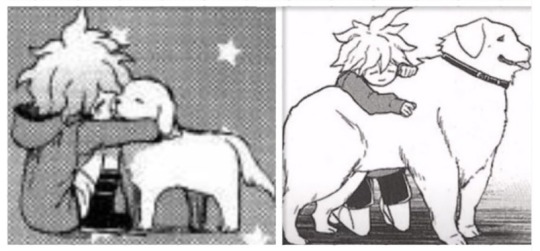
side note: genuinely nothing makes me as sad as nagito and his dog 😞 every time i mention them i get so upset
#nagito komaeda#makoto naegi#komaegi#sdr2#dr thh#lucky duo#lucky duo tangents#posting dr opinions is so scary#please be nice#cxsmictangents
56 notes
·
View notes
Text
Akira Ishida's Persona3 The Movie #4 Winter of Rebirth blu-ray comment translation
Ideas about Persona 3 The Movie
For Makoto Yuki, the 4 chapters of Persona 3 The Movie were the story of how, after Death was sealed within him and his heart became hollow, it began to fill up and repair through his interactions with the Specialised Extracurricular Execution Squad.
I feel like as a part the adroit way the narrative is structured around the recollection of Makoto's memories, the timeline and timing of what is revealed is shifted, so that the audience members who hadn't exerienced the game version may have felt a sort of eerieness when seeing Makoto's position when he first appears. Moreover, many of the plot points that happen in every chapter, for example things like the misunderstanding regarding Yukari and her dad, the case of Junpei and Chidori, and Aragaki-senpai and Amada-kun's relationship, seem depressing and gloomy. However, it's not because they are cheerful and happy, but because they accurately depict the wounds that people carry inside themselves that Makoto, by meeting and understanding them as he progress through the chapters, is able to aquire the precious things everyone should have.
I believe that the reason why Persona 3 The Movie's 4 chapters were well recieved by the audience was not just due to their interest in seeing the story they experienced in game in a film, but also because the scenery that Makoto sees made an impact and they related to it, and were curious to see how things would develop. This is how Persona 3 The Movie depicts the various ups and downs of the experiences that make up people's hearts, but my understanding of the word 'Persona' is that it comes from psychology.
When I first heard about the title and contents during recording, I wondered why you would call the incarnation of yourself for battle a Persona. A mask that people wear to represent themselves externally. It becomes a weapon to fight your enemies, the things that face you. This seems like everyday communication itself. So, when I think about the original meaning of Persona, I can make my own satisfactory reasoning as to why Makoto's Persona isn't in the form of a single one that evolves, but instead uses multiple from the beginning. The empty minded Makoto has no desire to be seen externally. It doesn't matter to him; he doesn't care how he's seen, so there's no reason for him to limit himself to one mask. What do you think? Personally, I quite like this reasoning. By viewing Makoto as having been an empty vessel, it makes it a major necessity for the story to develop him as a character in the film. Is it too much of a stretch to say that Makoto Yuki's story isn't just limited by the framework of a game, and has the potential to withstand the development and adaption, so therefore it was inevitable that it would be made into a movie? Speaking of which, the climax scene of Winter of Rebirth. After all he's been through, regaining his lost humanity and filling himself, Makoto reaches the point where he is willing to sacrifice his own life for his friends, just like his mother once did for him. There is no recklessness that comes from the indifference to the fear of death as in Spring of Birth. In order to achieve their shared goal of protecting the proof of existance people leave behind, Makoto decided to save the friends who had filled him and given him the elements to reconstruct himself and the world in which they live. And, as you all saw, this action was based on a self-sacrifical idea. For this reason Makoto, who can wear the masks of many Personas, gets every one of them shattered, and in the end can only move forward without wearing a mask. Don't you think this is a very symbolic scene?
He entrusts his friends with the same word his mother told him: 'live'. If a mother's love for her child is the ultimate, unsupassed thing, then you can say that Makoto's inner self, which can pour out that selfless love from the bonds with his friends, has completely regained human form. In addition, there is a mechanism in place which means that you can only go to the last stage without wearing the mask of a Persona. This can be seen as a message that the power to stand up to Nyx, the last opponent, the environment, and the world resides in someone's true essence, and that it is impossible to do so while wearing a false mask. It is also suggested by the composition that it is necessary to wear the mask of a Persona when defeating enemies, and to expose your true self when protecting loved ones. I would like to say that there is no way that exposing your true self could lead to strength, but once reset and gained new experiences, Makoto reached the next stage before others, attaining the answer to life. He is no longer an ordinary person. Even though it's fiction, I'm glad that it was Makoto and the others that were given the mission to fight Shadows in the Dark Hour. If it had been me, since I still haven't found the answer to life, the world would have ended on January 31st as planned, and these ideas would have never come into the world. If you think about it, that could have been okay, too.
劇場版「ペルソナ3」にまつわる妄想
結城理にとって劇場版「ペルソナ3」の全4章はデスをその身に封印され、心が虚ろになってしまった彼が、特別課外活動部の仲間達とのふれあいを経て、その中身を満たし直していくまでの過程をたどる物語でした。
理の記憶の甦りという物語構成の妙として、時間軸とそれが公開されるタイミングがズラされていたりしたので、ゲーム版に触れたことがない観客の皆さんは初登場時の理の立ち位置に一種の不気味さを感じたのではないかと思います。そのうえ各章で起こる事件は、例えばゆかりの父親に対する誤解や順平とチドリの一件、荒垣先輩と天田くんの関係など暗くて重いものが多い印象です。しかしそういった明るくてハッピーなものばかりではない、人が内側に抱え込んでいる傷の部分をきちんと描いたからこそ、彼らに出会ってそれを見つめることになる理も、章が進むにつれて、本来、人として持っているべき大切なものを、欠けることなく獲得していけたのだと思います。
劇場版 「ペルソナ3」の全4章が観客の皆さんに受け入れて頂けたのも、ゲームで体験したストーリーを映像で見てみたいという興味の他に、そんな理の見る景色に影響され同調することで、その先の展開が気になったからという部分もあったのではないでしょうか。このように人の心を構成する様々な経験の起伏を描いた劇場版「ペルソナ3」ですが、そもそもペルソナという単語は僕の理解では心理学周辺で出てくるものですよね。
一番初めのゲーム収録でこのタイトルと内容を知ったときに、バトルをするための自分の化身をペルソナと呼ぶなんて、何でシャレてるんだと思ったものでした。人が対外的に自分を表すためにかぶる仮面。それが敵、自分に向かってくるモノと戦うための武器になる。これは日常のコミュニケーションそのものに見えます。だから、そういうペルソナを本来の意味を考えると、理だけが一つのペルソナの進化という形ではなく、初めから複数のぺルソナを使い分けられるというところにも自分なりに納得のいく理屈をつけることができそうです。心の中が空っぽの理には端から対外的にどう見られたいという願望がありません。そんなことは彼にとってはそれこそ「どうでもいい」ことであって、どう見られても構わないからこそ、かぶる仮面を一つに限定する理由がないのです。どうでしょう。自分としてはこの理由付けの仕方、なかなか気に入っています。理が空の器であったと捉えることで、映画の登場人物として物語を展開させていく大きな必然性を持たせることにもなるのです。結城 理の物語はゲームの枠にとどまらず、映画化という展開にも充分耐えうるポテンシャルを持っていた、だから映画化されるのは必然だったというのはちょっと暴走し過ぎでしょうか。暴走ついでに、第4章『Winter of Rebirth』のクライマックスシーン。これまでの経験を経て、一度無くした人間性を取り戻し、中身を満たすことができた理は、かつて母親が自分にしてくれたように、仲間を生かすために自分の命を投げ出すという境地にまで達します。そこには第1章『Spring of Birth』の頃の己の死の恐怖に対するどうでもよさから来る蛮勇はありません。自分たちが存在した証を守り残すという全員の目標を果たすために、理は自分を満たしてくれた、自分を再構成するためのエレメンツをくれた仲間と彼らが生きていく世界を、今度は自分が救おうとしました。そしてそれが自己犠牲的発想に基づく行動だったのは皆さんも感じられた通りです。そのために数多くのペルソナという仮面をかぶることができる理が、ことごとくそのペルソナを打ち砕かれ、最後はその仮面をかぶらずに先へ進む。これはなかなか象徴的なシーンだとは思いませんか。
「生きろ」と自分に伝えてくれた母親と同じ言葉を仲間に託していく。母親が我が子を思う母性愛が、究極、無上のものであるならば、仲間たちとの間にその無償の愛情を注げるまでの絆を楽いた理の内面は、完全に人間としての形を取り戻したと言えるでしょう。それに加えて、ペルソナという仮面をかぶらない形でしか最後のステージに上がれないという仕掛けが用意されているわけです。これはニュクスという究極の敵、環境、世間に立ち向かえる力を宿す場所はその人の本質的な部分にしかない、虚飾の仮面を被った姿では無理なんだというメッセージにも見えるわけです。また、敵を倒すときにはペルソナという仮面をまとい、大切な人を守るときには自分の素の姿をさらけ出すことが必要だったという構図も暗示的です。自分なんかはとてもじゃないけれど素の自分をさらけ出したところで強さに結びつくとは到意思えないと言いたいところですが、一度リセットされ、新たに経験を積み直した理は、人より先に一つ上のステージ、命の答えに到達しているのです。もはや凡人ではありません。フィクションとはいえ、影時間でシャドウと戦う使命を与えられたのが理達で良かったとつくづく思います。もしも僕だったとしたら、命の答えにたどり着くのはまだまだ先のことでしょうから、世界は予定通り1月31日に終わっていたでしょうし、そうなったらこの妄想が世に出ることもなかったでしょう。そう考えるとそれもアリだったかもしれませんけどね。
#persona 3#p3#makoto yuki#spoilers#calls it delusions somehow manages to be one of the best analysis of not just makotos character but p3 as a whole i dont understand#this might not be entirely accurate but should be close enough#i know theres an english version of the blu rays but i neither own them nor have access to them so
27 notes
·
View notes
Note
urgh i need. akimina HCs immediately (holding you at gunpoint)
Mods send him to the torture nexus he keeps threatening me.
But yeah sure, why not? Still pretty new to 3 in comparrison so forgive these for being ooc and the like. Also sorry for how long I took to respond to your ask I could not figure out how to word some things.
• I see Akihiko as demisexual, it takes a long time for him to even consider crushing on someone but when he falls he *falls*. I honestly have no idea how I feel about Makoto's sexuality. He's totally trans tho.
• I feel like they both had a crush on each other for a pretty long time. Both just thinking "Man, he's so cool" about the other constantly before coming to the realization they wanted to be with each other. Just casually admiring the other throughout the day and even in Tartarus, thinking nothing of it until the realization hits them like a brick.
• Then the flirting begins. God. They both suck. Akihiko tries pick-up lines from a book, Makoto gets so desperate he asks *Junpei* for advice (luckily Akihiko did not understand any of the terrible pick-up lines)
• Them actually getting together was messy as hell. Both of them just barfing out their feelings and being relieved the other felt the same.
• Akihiko almost exploded the first time Makoto refered to him with just his name, no "senpai" attached. Makoto kept a pretty neutral face the first time he was called by his first name but inside he was just :D
• Makoto expresses love through gifts. It's usually small things, like making a playlist or giving Akihiko something he won at the arcade. Akihiko is more about expressinng his love through words. Even if he's not the best at conversation, he does his best to tell Makoto how much he loves him and how important he is to him.
• Very soft. They open up to each other about things they wouldn't tell anyone else. Like the two of them could just be chilling and cuddling in Akihiko's room and Makoto just suddenly brings up how much he mentions his parents, and Akihiko just nods and talks about how much he misses Miki.
• Neither are that into PDA. Maybe some handholding, but that's about it. But if Makoto see's one of Akihiko's fangirls checking him out? Oh you bet he's gonna give him a little smooch right there even if Akihiko combusts from it. Makoto's not possesive by any means, but he'll make sure they know who Akihiko's with.
• They totally spar for 'dates'. Friendly fights at the dorm (usually won by Akihiko) or battling with their Persona's during the Dark Hour (always won by Makoto). They make sure to patch each other up as soon as they're done, and be extra lovey-dovey to make up for any pain.
• 10/4 had a big impact on how both of them fight. Makoto's more reckless and puts less value on his own life so his teammates can survive, while Akihiko's more protective because he doesn't want to lose someone he loves again. Honestly the main source of arguments for them. They're both just greiving and trying to take care of the one's they love in their own ways.
• Akihiko was completely despondent for a good while after 3/5. Losing someone he loves yet again (and only a few months after losing Shinjiro) practically destroyed him for a long while. Despite this, I can't imagine his stance in the Answer changing. As much as he hates it, it was Makoto's choice to sacrifice himself, undoing it would be a massive disservice towards him. Besides, going back would put everyone in danger from Nyx again, and he knows their friends being in danger is the last thing Makoto would've wanted.
60 notes
·
View notes